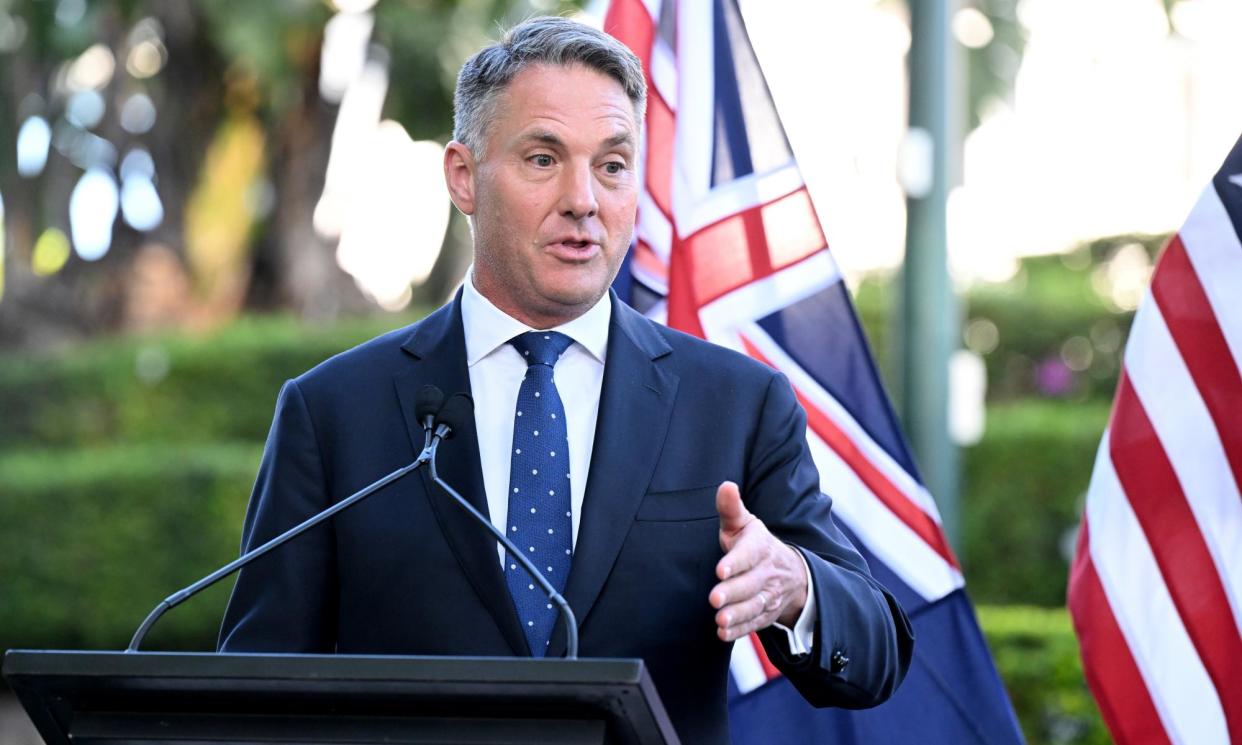Australia says military collaboration with Japan is not about creating ‘Jaukus’

Aukus partners are set to collaborate with Japan on military technology but they are not creating “Jaukus”, Australian leaders say.
In a joint statement released on Tuesday, the Aukus triumvirate of Australia, the United Kingdom and the United States confirmed it was considering teaming up with Japan for the second stage of the Aukus strategy.
The Australian defence minister, Richard Marles, the UK defence secretary, Grant Shapps, and the US defence secretary, Lloyd J Austin, said they were seeking advanced military capability “in support of regional stability and security”.
The idea has drawn the ire of China, which said it was “gravely concerned” about a plan that was “stoking bloc confrontation”.
Australia insists its plan to buy up to three Virginia-class submarines from the US while the local industry gets up to speed does not mean it is obliged to help the US in any military efforts in the region.
However, the US deputy secretary of state, Kurt Campbell, last week suggested they could be deployed against China in any military conflict over Taiwan.
China has always been a vocal critic of Aukus and its implied mission to push back against Chinese power.
While Aukus talk often focuses on Australia’s planned procurement of nuclear-powered submarines, the boats are “pillar 1”.
Pillar 2 will include underwater drones, quantum technologies, artificial intelligence, cybersecurity, electronic warfare and hypersonic and counter-hypersonic capabilities.
The Australian prime minister, Anthony Albanese, said on Tuesday that Japan was a “natural candidate” for collaboration.
“We’ve already stepped up our defence relationship with Japan in agreements I’ve signed with prime minister [Fumio] Kishida, including access by Japan for Australian bases,” he said.
Related: Essential report: will a Trump win upset Aukus? – podcast
“We have had recently joint naval operations with Japan, including here in Australia, but, when we look at pillar 2, that project-by-project approach is there. What is not proposed is to expand the membership of Aukus.”
Marles said Japan had a “very advanced technological industrial base” and did “a lot of incredible work in defence industry as well” but would not be part of the three-nation team.
The Australian defence industry minister, Pat Conroy, said any projects would be “about technological collaboration where it makes sense for all parties involved”.
“It’s not about Japan joining Aukus. It’s not about Japan being part of the Five Eyes intelligence community,” he told ABC’s Radio National.
China’s foreign ministry spokesperson, Mao Ning, said the US, UK and Australia were “sending signals of Aukus expansion” and “escalating [an] arms race in the Asia-Pacific to the detriment of peace and stability in the region”.
“China is gravely concerned about it,” Ning said. “We oppose relevant countries cobbling together exclusive groupings and stoking bloc confrontation.
“Japan needs to earnestly draw lessons from history and stay prudent on military and security issues.”
Japan became a pacifist nation after the second world war, when the US dropped atomic bombs on Hiroshima and Nagasaki and enforced a constitution that the nation never maintain military forces. About a decade later, it created the Self-Defense Forces. More recently, in reaction to China’s belligerence and North Korea’s aggressive tactics, it has been increasing its defence spending and capability.
Related: Guess who might be joining the sub club – will Aukus need a new name? | Fiona Katauskas
The Aukus defence ministers said the “acquisition of a conventionally armed, nuclear-powered submarine capability is a necessary response to the rapidly evolving strategic environment”.
“Strengthening our trilateral defence capabilities and our industrial capacity will enable Aukus partners to deter coercion or aggression in the region more effectively,” the statement said.
It went on to say that the Aukus nations had been clear they planned to “engage others” in pillar 2 projects, and were “considering cooperation with Japan”.
“Our objective remains to further the delivery of advanced military capabilities to our respective defence forces in support of regional stability and security; we are confident that engaging like-minded partners in the work of pillar 2 will only strengthen this pursuit,” the statement said.
“Recognising Japan’s strengths and its close bilateral defence partnerships with all three countries, we are considering cooperation with Japan on Aukus Pillar II advanced capability projects.”
The US president, Joe Biden, is set to meet with Kishida this week, and the pair will reportedly discuss the collaboration.
Since Aukus was announced in 2021, New Zealand, Canada, South Korea have also been mentioned as potential partners.


